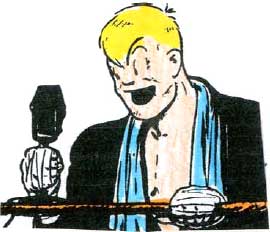|

This story was published in Radio Recall, the journal of the Metropolitan Washington Old-Time Radio Club, published six times per year.
Click here to return to the index of selected articles.
|
|
JOE PALOOKA
by Jack French © 2011
(From Radio Recall, April 2011)
It was a comic strip about a likable boxing champ, his bald-headed manager, and his lovely girl friend who ultimately married him. The strip debuted in 1928 and there was a brief radio series and several movies based upon it. But it ended tragically for the creator, Ham Fisher, who committed suicide in 1955.
Fisher was a fair cartoonist in the 1920s and came up with the idea of a strip about “Joe Palooka” a champion boxer and a gentle soul who trusted the world. After a few years of trying, Fisher, who was also a salesman for a newspaper syndication, sold the strip to enough newspapers to make it worthwhile for him.
He wrote out the story lines but turned over all the art work to a very young Al Capp. For Capp it was long hours at low pay while Fisher got all the glory and the profits. This went on for years during which time Joe Palooka became one of the top ten comic strips in popularity.

The radio series went on the air in April 1932 on CBS, a 15 minute show twice a week, sponsored by the Heinz Company. It would last only five months, probably because it was written more like a soap opera than an adventure thriller. Despite its short run, there were several cast changes among the leads. Joe was played by Ted Bergman and later by Norman Gottschalk and Karl Swenson. Joe’s fiancee was played by both Elsie Hitz and Mary Jane Higby at different times, while Frank Readick was the voice of Knobby Walsh, the manager. Four audio copies of the series have survived and are in circulation.
Capp left the strip in 1934 when he got his own strip, “Lil Abner” into syndication. Fisher hired Moe Leff to continue in Capp’s place as the artist and the strip remained popular. When Fisher had Joe join the Army in WW II, it raised his readership even higher and by the time Joe married Ann in 1949, it was a national media event.
Fisher also made money selling the rights to Joe to appear on the silver screen. In 1933 the film “Palooka” came out with Jimmy Durante as Knobby and Stuart Erwin as Joe. This was followed by nine movie shorts (22 minutes) most of which had a cast of Joe (Robert Horton), Knobby (Shemp Howard) and Anne (Beverly Phalon.) There were more; from 1947 to 1951 a half dozen motion pictures were released with Joe Kirkwood, Jr. as the champ and Leon Errol as his manager.
But Capp never forgave Fisher for his years of servitude so he blasted Fisher, by satirizing him in the “Lil Abner” strip and writing articles about him in major periodicals, telling how cheap and unkind Fisher was.
In the 50s Fisher fought back in a curious fashion. He forged some “L’il Abner” strips to include obscene material and then got Capp brought into court. Capp easily proved his innocence, merely by entering into evidence the original strips from the newspapers as printed.
Fisher lost his case in court but it would get much worse. Appalled at Fisher’s devious stunt, the disgusted members of the National Cartoonists Society expelled Fisher in the mid-50s. The disgrace was more than Fisher could bear and he took his own life, two days after Christmas, in 1955.
Moe Leff tried to keep the strip going, but without the inspiration of Fisher, it slowly lost readers and eventually was dropped from syndication. The Champ had finally been KO-ed.
|